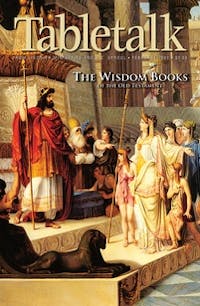
Request your free, three-month trial to Tabletalk magazine. You’ll receive the print issue monthly and gain immediate digital access to decades of archives. This trial is risk-free. No credit card required.
Try Tabletalk NowAlready receive Tabletalk magazine every month?
Verify your email address to gain unlimited access.
He was at least an insightful man, if not a wise man, who first said, “I care not who writes a nation’s laws, as long as I write the nation’s songs.” He understood that what shapes our lives is rather more potent than that which merely hedges our lives. We are at least obtuse men, if not foolish men, when we labor so hard to seize the engines of political power for the sake of the kingdom. It is a good thing that we aspire to see every knee bow and every tongue confess that Jesus Christ is Lord. His reign indeed covers all things political. But it is a bad thing that we would rather see His lordship confessed in a courtroom than in a song.
While we rightly affirm that man is soul and body (not as we too often think, souls in bodies), we would be wrong to pass over the remaining distinction between mind and heart. We are two things, the material and the immaterial, and that which is immaterial is at least two things, what we think, and what we feel. A man of integrity has mind and heart in harmony. Few of us are there, however. Excitement, more often than not, is a function of the heart more than the mind. As we consider law, usually our minds are more engaged than our hearts. It is a rare bird indeed whose nerves begin to twitter when they hear, “In re: Carleton versus the state of Nevada…” or “Whereas the charter of the town of Mendota gives license to all who live therein to….” Music, on the other hand, has charms.
Music has the unique ability to bring together heart and mind, to both teach and inspire at the same time. Music, more than abstract arguments, more than abstract law, shapes souls. We are what we sing. Which is why He who is wisdom wisely gave us songs.
One of the weaknesses of the loss of psalm singing in the church is that we have lost sight of the power of psalms as song. We know that the book of Psalms are God’s Word. We know that they contain wisdom. We may even read and study them in an attempt to internalize the wisdom they contain. They become fodder for sermons, proof texts for sundry theological positions. But that’s not the way God intended us to be shaped by the Psalms. He wrote them so that we would sing them. (This doesn’t mean, of course, that this is all we might sing. Sadly, however, too many of us who conclude we may sing songs that are not Psalms don’t take the trouble to sing the Psalms. We seem to think our only choices are Psalms only, or no Psalms at all.) Singing the Psalms moves their wisdom from our brains into our hearts. And our hearts are the font of our actions, our lives.
It seems even the world is beginning to figure this out. A recent study (apparently sponsored by the Institute for the Incredibly Obvious) demonstrated that the more teenagers are exposed to sexually explicit media, whether it be television, video games, movies, or music, the more likely they were to engage in sexual behavior at an earlier age. The world has not yet passed laws requiring teenagers to be sexually active. While we’re busy creating political action committees to keep condoms out of “our” schools, while we push for “abstinence training” in “our” schools, “our” iPods are telling us (and forgive the anachronism) that we feel like making love, that what we need is sexual healing. The iPods win every time.
If we who serve Christ sing His songs, the songs of wisdom, and the world outside the church sings songs of folly, what we would expect is different worlds. We should expect our lives to be marked by wisdom, by fidelity, by godliness. What we find, again according to sundry studies, is that evangelicals, both unmarried young people and married adults, are roughly as likely to be fornicators or adulterers as their unbelieving counterparts. The reason is likely this, we don’t listen to the music of wisdom, but instead listen to the music of the world. Our ears are as plugged into folly as the ears of our neighbors.
James Adams, in his fine book War Psalms of the Prince of Peace, affirms that the Psalms, however a rich source they might be on the life of David, exist first to tell us the story of Jesus. The Psalms cover the gamut of human experience. You will find there triumph and defeat, confidence and uncertainty, joy and despair. It is because these songs tell us the story of Jesus, however, that they are songs of wisdom. As these songs indwell us, as they shape not just our thinking but our feeling, we will become more like Jesus, who is the very personification of wisdom. As these songs proceed from our lips, we not only speak wisdom, but speak Jesus, showing forth His glory. We ought to be distinct from the world around us. We are called to be a set-apart people. Perhaps by His grace we might become distinct, if we would sing an old song to the Lord, if we would sing the Lord’s songs to the Lord. If we would sing wisdom, perhaps Wisdom might bless us.
